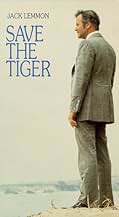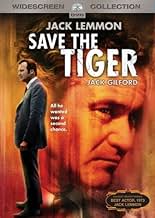Füge eine Handlung in deiner Sprache hinzuTroubled garment manufacturer Harry Stoner tries to make his small debt-ridden factory survive, hires an arsonist to burn down a building so Harry can collect the insurance money, he pimps f... Alles lesenTroubled garment manufacturer Harry Stoner tries to make his small debt-ridden factory survive, hires an arsonist to burn down a building so Harry can collect the insurance money, he pimps for clients, and has flashbacks to the war.Troubled garment manufacturer Harry Stoner tries to make his small debt-ridden factory survive, hires an arsonist to burn down a building so Harry can collect the insurance money, he pimps for clients, and has flashbacks to the war.
- 1 Oscar gewonnen
- 2 Gewinne & 5 Nominierungen insgesamt
- Ula
- (as Liv Von Linden)
- Tiger Petitioner
- (as Biff Elliott)
- Model
- (Nicht genannt)
Empfohlene Bewertungen
He plays Harry Stoner, owner of an heavily indebted ladies designer clothes manufacturing company. The film covers just 2-3 days of his life and we get a pretty good idea of his sad existence in the urban jungle and what he has become - no longer a good, decent person fighting for the right cause. There are references to Stoner's war record and patriotism throughout the film. The fact that the US was fighting the very unpopular Vietnam war could have influenced the themes of this film.
There is little in the way of plot but there is a rich characterization made deeper by the crises in Stoner's life and Lemmon's excellent depiction of a man who is cracking at the seams. My favorite scenes were the ones in the car with the hippie girl towards the beginning of the film and the question she asked him and Lemmon's comic reaction....
The best of these options is to start an arson fire in their factory and hope the insurance payoff will cancel their debts and afford a fresh start. Gilford is against it on moral principles, but Lemmon is a guy who can't afford morals at this stage as George Bernard Shaw once put it.
Still he looks back on his youth and the things and people that moved him back in the day and wonders how he got in the mess he's in. It's not supposed to be like this for people like him who've had ideals and tried to play by the rules.
In his facial expressions, his vocal intonations, in every move of his body and soul, Lemmon becomes Harry Stoner the latest convert to cynicism. It's what got Jack Lemmon his Second Academy Award, this time for Best Actor. Interesting that this very cynical film came out the year that a whole lot of Americans became very cynical as Watergate was unfolding before them.
Arson fire is a tricky business and Lemmon puts himself in the hands of Thayer David who I think gives his best screen portrayal here as the professional arsonist. Listening to him, as creepy as he sounds, he comes off as a man who knows his business. He even at one point offers to return the down payment given him when he explains that insurance will never pay off with all the fire regulation violations Lemmon and Gilford have in their place. It's a business with him and no fatalities must occur, otherwise it's a Law and Order episode.
Jack Lemmon was one of the best around, could do all kinds of comedy and drama with equal skill. Building on the characters he created for Billy Wilder, he's an older man now who's in no position to start from scratch again. Lemmon plays a character that all of us over 40 can definitely relate to.
Save the Tiger is a serious and thought provoking drama about choices each and every one of us could face some time in our lives. It's universality of theme will make it an enduring classic.
The film almost has a low budget, made-for-television feel and look. But it still delivers an engrossing story of people under stress.
Little did I know, that thirty years later, I would be going through one of my own and would once again be drawn to, and struck by, the sincerity and integrity of Jack Lemmon's performance.
The film has it's critics, self indulgent, sentimental and simplistic are only some of comments made, but the film still has the power to make you question what you have done with your own life. It asks you how you got to where you are, and it makes you ask yourself if it was all worth it. It also questions/exposes the Great American Dream and asks, if that is not the be all and end all, then what is?
Harry Stoner is not a man you should feel sorry for, but Lemmon's interpretation forces you to question his ideals and your own, as you follow this crisis point in his life. In the end, whether you like the film or not, or agree with what it is trying to say, you can't deny Lemmon his Academy Award.
Wusstest du schon
- WissenswertesActor Jack Lemmon waived his usual fee and worked for scale plus a percentage of the gross. Scale was US $165 a week at the time.
- PatzerHarry wipes Fred's face almost completely clean of the red body paint. In a subsequent shot, Fred's face is covered with red paint again.
- Zitate
Myra: Are you OK? Do you want something?
Harry Stoner: Yes. I want that girl in a Cole Porter song. I wanna see Lena Horne at the Cotton Club - hear Billie Holiday sing fine and mellow - walk in that kind of rain that never washes perfume away. I wanna be in love with something. Anything. Just the idea. A dog, a cat. Anything. Just something.
- VerbindungenFeatured in Paramount Presents (1974)
- SoundtracksAir Mail Special
Composed by Jim Mundy, Benny Goodman & Charlie Christian
Top-Auswahl
- How long is Save the Tiger?Powered by Alexa
Details
- Erscheinungsdatum
- Herkunftsland
- Sprachen
- Auch bekannt als
- Save the Tiger
- Drehorte
- Produktionsfirmen
- Weitere beteiligte Unternehmen bei IMDbPro anzeigen
Box Office
- Budget
- 1.000.000 $ (geschätzt)
Zu dieser Seite beitragen


































